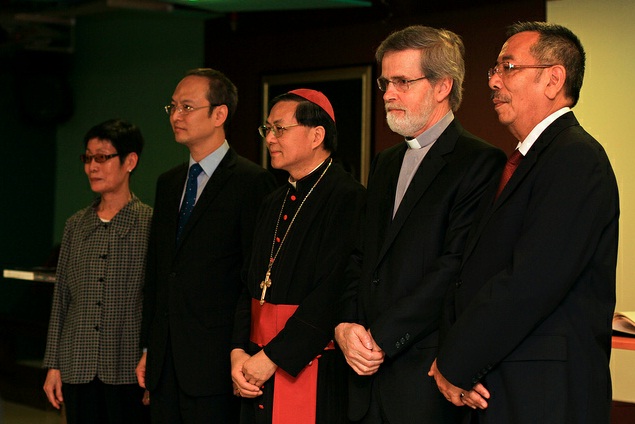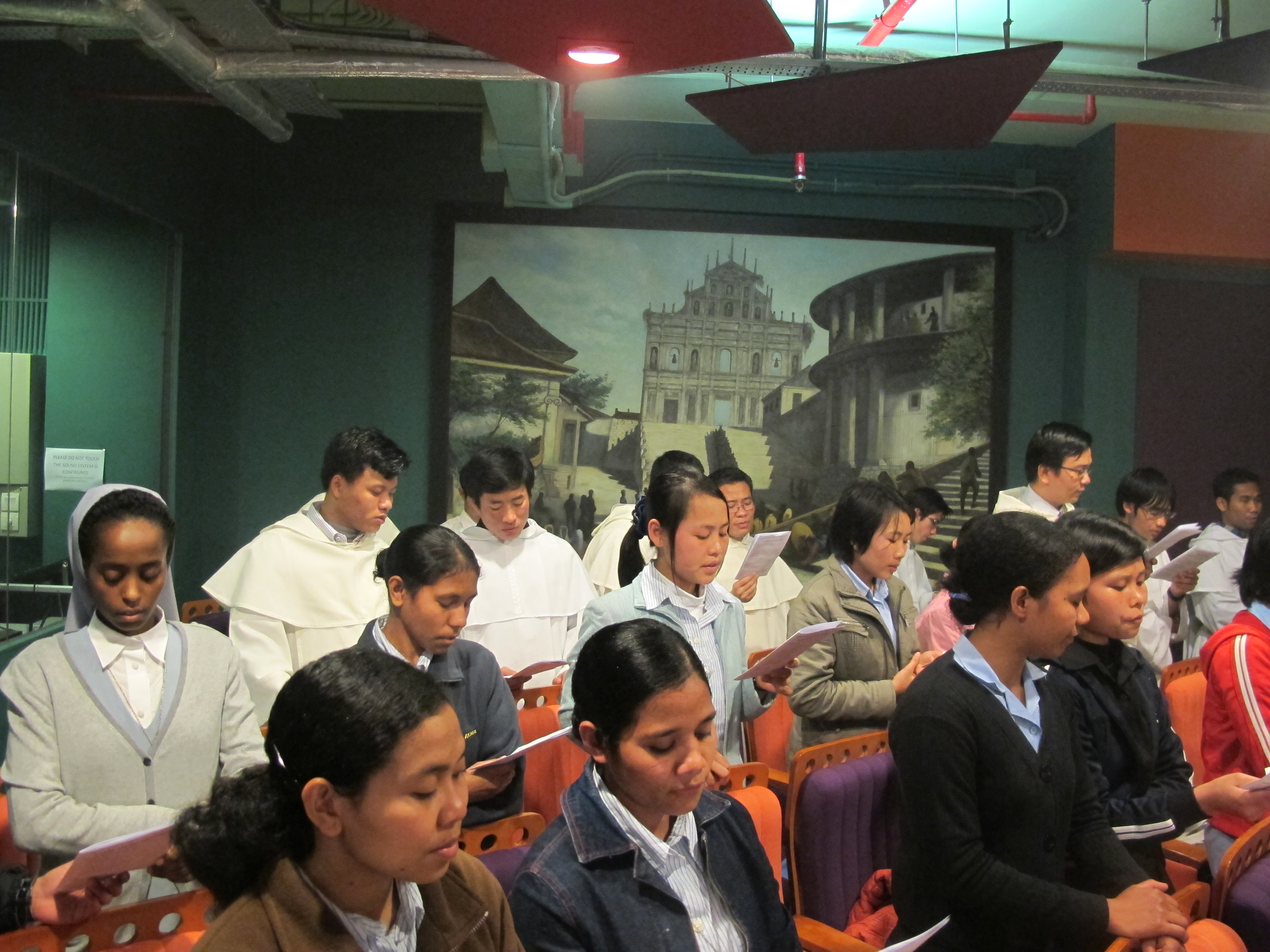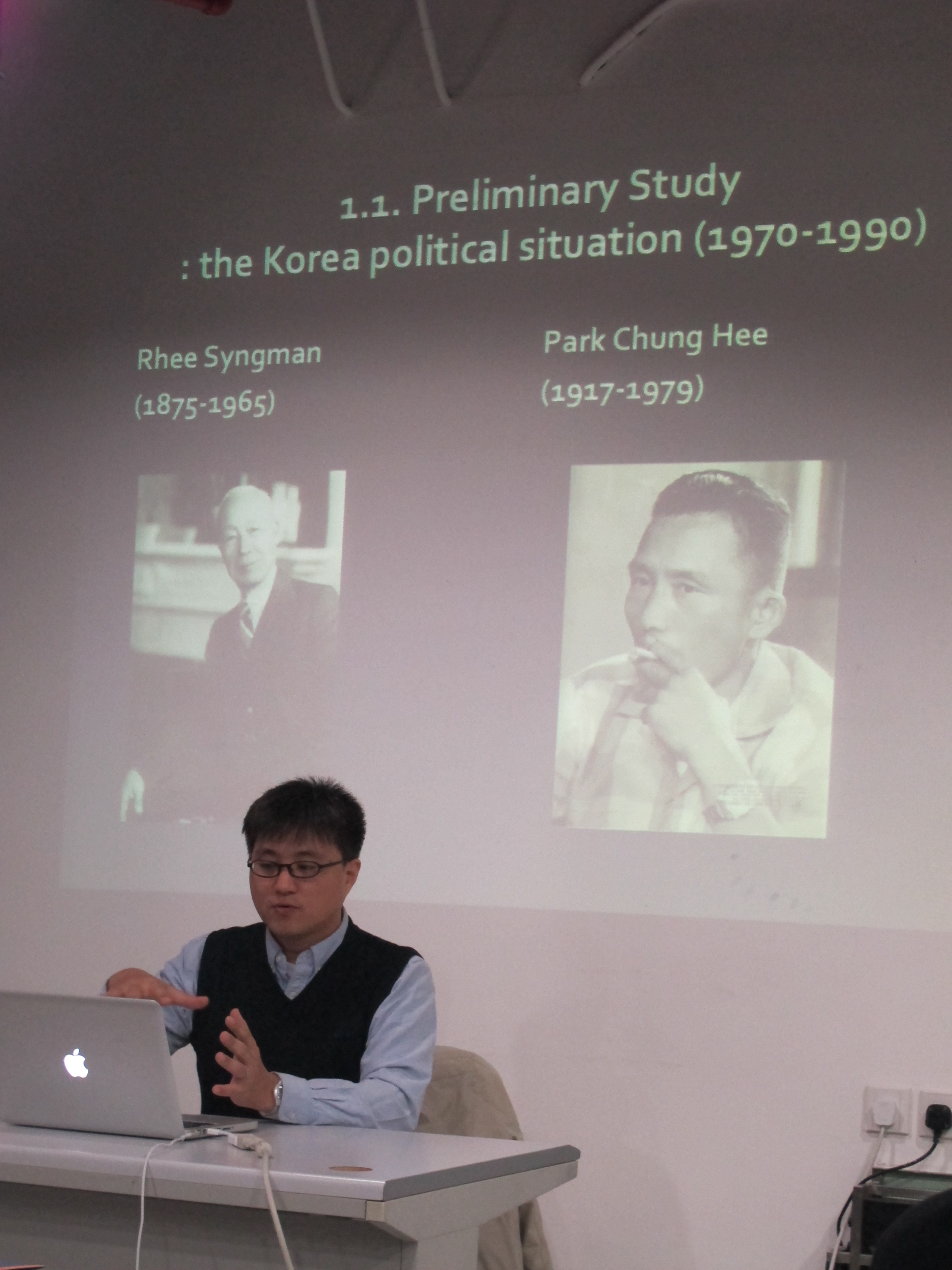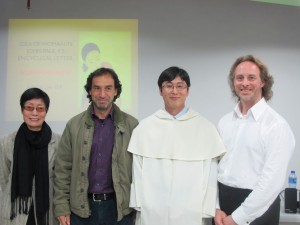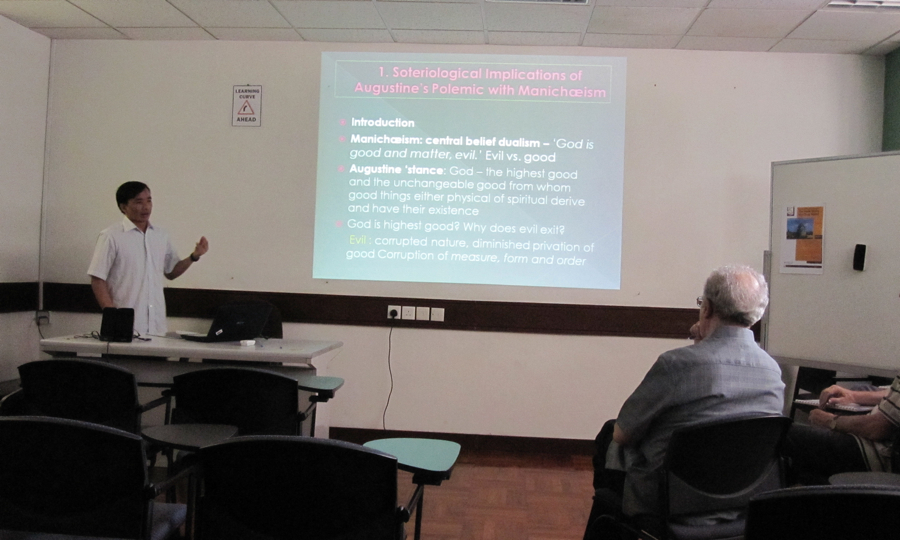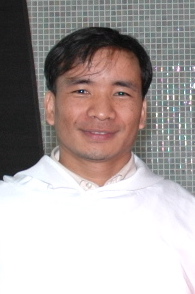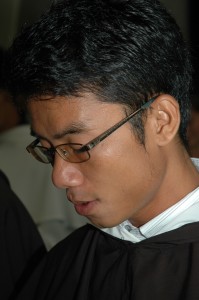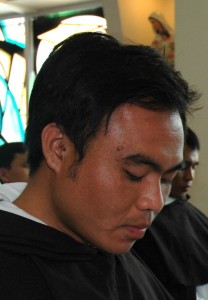
(On the Feast of St. Thomas Aquinas, January 28, 2012, the new Center of Institutional Studies of the Dominican Province of Our Lady of the Rosary was inaugurated at St. Dominic’s Priory, Macau. It is called St. Dominic Center of Studies. A formal lecture highlighted the Academic Activity for this historic event. It was given by the Regent of Studies of the Province. Hereafter we offer the text of the lecture)
Â
           On the occasion of the official inauguration of St. Dominic Center of Studies, Macau, I have been kindly asked to speak on The Place of Study in the Dominican Order. Hereafter I present some notes on the subject.
I shall develop the topic in three major points addressed by these three questions: What is the current normative of study in the Order? What is the end of Dominican Study? Â How to love study?
We begin facing the first question: What is the current normative on study in the Order of Preachers?

 1. NORMATIVE ON STUDY AND ITS PLACE IN DOMINICAIN LIFE
(Parenthetically, let me point out that I am aware of the fact that we all here present know the nature of study)
In this first part, I shall present the norms on study we read in the Ratio Studiorum Particularis (RSP) of the Province, which was approved by the Master of the Order, Fr. Bruno Cadoré, OP, on July 1, 2011. The RSP is made up of the general normative of the Order on study as presented by the Ratio Studiorum Generalis (RSG, Rome: Santa Sabina, 1993), and the Statutes of the Province and Declarations, Ordinations, and Exhortations of the latest Provincial Chapter (see ACP 2009 Hong Kong).
Let us reflect briefly on the central place of study, first in general, and second, in the different stages of Dominican intellectual formation.
Â
1.1Â THE CENTRAL PLACE OF STUDY IN GENERAL
(See Province of Our Lady of the Rosary, Ratio Studiorum Particularis, Hong Kong, July 5, 2011, General Introduction; www.dominicansmacau.org)
St. Dominic continues telling his brothers today what he told them before the end of his life: that he wanted them “to study, preach and establish convents†(LCO, no. 76). The essential elements of the Dominican charism – particularly prayer, community life, study, and preaching – are “inseparably interconnected, harmoniously balanced and mutually enriching†(LCO, Fundamental Constitution, IV). Study then is an essential part of the Dominican vocation (LCO 226).
Since the beginning of the Order, and later on in its dynamic adaptations and renewals, our Book of Constitutions and Ordinations (LCO) speaks powerfully of the importance of study in our Order (LCO 76-83); also the Ratio Studiorum Generalis (Rome, 1993), and the Acts of the General Chapters (e. g. ACG 2001 Providence, nos. 104-158; ACG 2004 Krakow, nos. 124-160; ACG 2007 Bogota, nos. 99-130; ACG 2010 Rome, nos. 83-104).
The LCO provides also a detailed program for the organization of studies in the Order. It gives pre-eminent importance to the different kinds of centers of studies, particularly to the Center of Institutional Studies, in our case, St. Dominic Center of Studies, with the valuable collaboration of the School of Christian Studies of the University of Saint Joseph, Macau. (See RSP, Chapter II: Organization of Studies, Nos. 36-44). Throughout our history the Center of Institutional Studies has occupied a central place in the organization of studies in the Order not only by reason of its very nature but also as the main promoter of study in a particular Province. The first Center of Studies was Saint Jacques of Paris, which counted with the collaboration of the University of Paris. (See H. M. Vicaire, Dominique et ses Precheurs, Parid 1973, p. 74; Felicisisimo Martinez, OP, Espiritualidad Dominicana. Madrid: Edibesa, 1995, pp. 164-170)
Dominican study (study in the Dominican normative and tradition) is a specific kind of study, which has to be systematic, solid, critical, and open (RSG 6) and, above all, apostolic study (LCO 77; see ACG 2001 Providence 104; ACG 2010 Rome 54). It is not only essentially important in the Order. It is a priority to the point that other religious observances may be dispensed for the sake of study. Even common prayers, in particular the hours of the Divine Office, may be dispensed for the sake of study. Moreover, the prayers must be said breviter et succinte†– briefly and summarily – so that they will not be an obstacle to devotion and to study.
1.2Â THE CENTRAL PLACE OF STUDY IN THE DIFFERENT STAGES OF FORMATION
As a priority of Dominican vocation, study is a lifelong task for all the Dominicans. Our Provincial Chapter (Hong Kong, 2009) says that from initial formation students must acquire “a permanent habit of contemplative study ordered to our mission†(ACP 2009 Hong Kong, 155).
Â
The Pre-Novitiate
Before being accepted to the Pre-novitiate, the candidate must show an initial preparation and interest in study. Through the Pre-novitiate, the postulants or aspirants begin to acquire the habit of contemplative study. (See ACP 2009 Hong Kong 155; RSP, nos. 5 and 6)
The Novitiate
In the Novitiate, the novices come to understand in a deeper way the Dominican vocation and the Dominican way of life (LCO 177). The Novitiate is also the time to discover the essential place of study in the Order and in our Province, and its central place in the life of every Dominican. (See RSP, no. 11)
Institutional Studies
The Institutional Studies comprise philosophical, theological and pastoral formation. Following the guide and example of St. Thomas Aquinas (RSG, Preface, IV, and 16, III, See John Paul II, Fides et Ratio, 1998, nos. 43-44), our philosophical and theological studies present the truths of revelation, contemplate the signs of the times, search for truth in different faiths and cultures, in science and technology, and walk with all by the path to truth. In our missionary Province, its multicultural context must permeate also the intellectual formation of its students (ACP 2009 Hong Kong, 138, a; RSP, 14 and 16)).
Complementary Studies
After finishing their institutional studies, our students may pursue complementary or post-graduate studies. Complementary studies to be pursued by able and interested students must be relevant to the Church, the Order, and the Province. (RSP, 24 and 26)
Continuing Formation
Continuing formation is made up of four dimensions, namely, the human, spiritual, intellectual and pastoral formation (cf. John Paul II, Pastores Dabo Vobis, 1992). The Ratio Studiorum Particularis focuses on intellectual formation (RSG 29). The intellectual formation is the responsibility of, first, every individual brother, second of the local community, and, third, of the whole community of the Province (RSG 30). Superiors in particular are to promote “energetically†study and ensure that the brothers have “the means and the opportunities†for continuing study (LCO 87), including in particular the use of computers and internet. (ACP 2009 Hong Kong 168; cf. ACG 2010 Rome 136-139); RSP, 29, 30 & 32) RSG tells us that the intellectual life is “a permanent option for renewal throughout our lives†(RSG 5; RSP, General Introduction).
The primary importance of study will become clearer as we proceed with our reflection. (By the way, we know that study is also as important in other religious congregations and ecclesiastical institutions. While all religious congregations and institutes – and all Christians -work for the Kingdom of God, each walks its own path, hopefully in a harmonious manner. I am trying to present the Dominican way!)
We now go to the second question of our inquiry: What is the end of study in the Order of Preachers?
2. PREACHING THE TRUTH IN LOVE
Â
Order of Preachers! The identifying sign, the genetic code so to speak of the Dominicans is:  “the preaching for the salvation of humanity, the ministry of the Word, the mission of evangelization†(General Chapter2010, Rome: Acts, No. 50).
The study that Dominic implanted in the Order was intended “to foster preaching.†What kind of preaching? A preaching, which is “inseparable from a passion for the truth†(ACG 2007 Bogota, no. 100; see also nos. 99-110; see ACG 2009 Rome, no. 54. See RSP, Gen. Introduction).
Hereafter, we develop two points: first, the truth to be preached, and, second, preaching the truth and love.
2.1Â THE TRUTH TO BE PREACHED
Study is not the end of the Order of Preachers, but a necessary means, a condition sine qua non for the ministry of preaching, which is the end of study (ACG 2010 Rome 54). Dominican study is not for its own sake but for the sake of preaching (II-II, 185, 5). Study is ordered to knowing and preaching the truth. St. Augustine writes: “Quid enim, fortius desiderat anima quam veritatem?†(“What does the soul of man desires more deeply than truth?â€) (Commentary on the Gospel of John, 26, 5; quoted by Benedict XVI, Message World Day of Justice and Peace: January 1, 2012, no. 3; www.zenit.org/phprint.php) Study calls the brothers to “stimulate people’s desire to know the truth†(LCO 77, II).
Truth is the ideal of the Order: Veritas. We are called Order of Truth: Ordo Veritatis. Study is the search for truth, a service to the truth, to the truth which saves. (See Felicisimo Martinez, Diez, OP, o, c. pp. 143-191; Paul Murray, OP, The New Wine of Dominican Spirituality. London: Burns & Oats, 2006, pp. 78-127; see II-II, 188, 5)
Certainly, the grace of preaching is a gift from God. Still “a sensible preacher ought to do what he can to ensure that his preaching is commendable, by carefully studying what he has to preach†(Humbert of Romans, Treatise on the Formation of Preachers, VII, 82).
Study is a necessary instrument towards some knowledge of the truth. What matters on the journey to truth is not to know many things, but to know things well. In our study we try to answer the questions of our time – not of the time of St. Thomas or Bartolome de las Casas, or Lacordaire.
In our technological age there is much information and not as much reflection, contemplation, interior silence needed to listen to the Word – to God. In his Counsels to a Student, Thomas says: “Do not waste your time in useless talkingâ€- or chatting! (See Lorenzo Vicente Burgoa, “Recomendaciones de un sabio para la adquisición del conocimiento,†STUDIUM, Vol. LI, No. 3 (2011), pp. 449-467).
Study is a means to search for the elusive truth, the truth that, as Vatican II tells us, “cannot impose itself except by virtue of its own truth†(Dignitas Humanae, 1). Moreover, the truth to be preached must be in love.
2.2Â TRUTH AND LOVE
St. Paul advises us “to live by the truth and in love†(Eph. 4:15-16): veritas in caritate. Benedict XVI suggests caritas in veritate (2009). For their part, the Dominicans, speak of veritas in msericordia, or misericordia veritatis. Different ways of saying basically the same thing: truth and love are interconnected and fertilize each other. Study is necessarily linked to the constant search for the truth in love (veritas in miseriricordia). (See ACG 2001 Providence, nos. 104-105)
Searching the truth in love, is “intellectual compassion†made available to others through study and the consolation of truth (ACG 2001 Providence, nos. 104-108). Study in Dominican perspective is linked to charity and to the Gift of the Holy Spirit which perfects charity, namely wisdom (or tasteful science). Writes Thomas Aquinas:
It belongs to the gift of wisdom not only to meditate on God but also to direct human actions. Such direction is concerned first and foremost with the elimination of evils, which contradict wisdom. … Ultimately, it has to do with the aim of how everything might be led back to the order justly due it: something which belongs to the idea of peace†(II-II, 45, 6, ad 3). (See ACG 2001 Providence, no 106)
           The path of knowing the truth, of knowing God is not only study but also love. Love gives knowledge by connaturality – a knowledge that comes from the practice of virtues, above all love. Origen said that “the best way to know God is through love, and there can be no authentic scientia Christi apart from growth in his love†(Enarratio in Psalmos, 85, 7: PL 37. 1086; quoted by Benedict XVI, Post-Synodal Apostolic Exhortation Verbum Domini, Vatican City 2010, no. 86).The path of love as a way to God’s knowledge is clearly shown in the writings of the mystics, like in Catherine of Siena and Teresa of Avila.
Dominican study as a means to preaching and the salvation of peoples is always  committed as much as possible to the direct proclamation of the Gospel, which means not just with words that the wind blows, but also with good deeds – like Jesus who went about “doing good†(Acts 10:38).
Charity, or love of God and neighbor, urges us to say or defend the truth not fanatically or aggressively but respectfully, serenely – mercifully. Loving the people we preach to – the whole humanity – is a requirement to preach evangelically to the people. The great preacher of last century Fr. Vincent McNabb, OP says: “The world is waiting for those who love it… If you don´t love men don’t preach to them – preach to yourself.â€
We study to know the truth, to say the truth, and to live the truth in love, to be witnesses of the truth (Jn 18:37), which is the best way of preaching the truth. Study is an instrument to know the truth, which implies orthodoxy (correct doctrine) and orthopraxis (correct practice). We know that only good practice – orthopraxis – saves us and others.
Christian love as love of neighbor means love of all neighbors; preferentially of the poor neighbor. Dominican study – the study of God and his creation – ought to help liberate those who are enslaved in our world; that is the excluded, the marginalized, and the needy. Study has to go down from the tower of doctrinal speculation and utopian ideals to the classroom, the square, the internet windows and other modern places. In this common endeavor, there ought not to be – as it has been at times – dichotomy between doctors and missionaries, intellectuals and preachers, theologians and social activists. There must be communion and complementarity between Thomas and Vincent Ferrer, Francisco de Vitoria and Bartolomé de las Casas, Schillebeeckx and Gustavo Gutierrez. And always, putting the accent where it ought to be: preaching the Word against any kind of slavery, and in favor of a dignified life for all: Prius vita quam doctrina! (First, life; then, doctrine)
Dominic when he was a student in Palencia sold his precious books. Why? Dominic answers: “I refuse to study in dead skins while men are dying of hunger†(Acta Canonizationis S. Dominici, 35, p. 153; quoted by Paul Murray, OP, o. c., p. 120). Our vow of poverty means – at least – a simple life style. Without it, our study for preaching will not be – is not – credible. (See General Chapter 2010, Rome, Acts, no. 72).
Last December we Dominicans celebrated the 5th Centennial of the Sermon of Antonio Montesinos in Isla Española (now Dominican Repuiblic and Haiti), who dared to preach a sermon prepared by the whole Dominican Community accusing the colonizers of enslaving the natives. From the pulpit, on the third Sunday of Lent, Montesinos thundered: “By what right and by what justice do you hold these Indians in such a cruel and horrible servitude? Are these people not human beings? Are you not obliged to love them as you love yourselves?
There can be no love without justice, and there cannot be justice/love without the preferential option or love for the poor, who represent Christ in a very special manner (Mth 25:31-46). By the way, the option (or love) for the poor is not an optional option. It is an obligatory one, particularly for religious who try to follow Christ and imitate him in a close and intimate manner. No wonder our brother Gustavo Gutiérrez says that the main theological question today is: “Where are the poor?â€
Study urges us to love God, neighbors and needy neighbors in particular. Dominic was asked once: “What are the books that you study?†His answer: “I study more in the book of charity than in any other book†(In libro caritatis plusquam in alio). The book of charity is the book of Christ. Our study is centered on Christ, the Truth we have to know, live, and preach today in the Church and in different situations (see LCO, Fundamental Const., V). Called to walk with the Lord (ACG 2010 Rome, 59), our teaching, preaching and ministering must be “a clear, unequivocal and direct proclamation†of Jesus Christ as the center of our ministry (ACP 2009 Hong Kong 23; RSP, General Introduction). Hence, our study is “a fundamental part of our journey into the contemplation of Him in whom (Jesus) we shall find full happiness†(Ib. Chap. IV, Intro).
The book of Christ is also the book of the cross which St. Catherine of Siena called the book of life: “Our Master was raised up on the chair of the cross so that we could study him better†(St. Catherine of Siena, Letter CCCXVI; quoted by Paul Murray, OP, o. c., p. 125). The martyrs of our Province in Japan, Vietnam, Spain, and China (five of them now saints lived for a while in Macau before they went back to our Fukien mission in 1747); our martyrs knew about the book of Christ and the book of the cross and encourage us, the members of the Province in particular, to study them as primary sources of our proclamation of the truth, to study the crucified and risen Lord, Jesus Christ, who is the Way, the Truth and the Life (Jn 14:6).
Now we are ready to face the third question: How to love study?
3. DOMINICAN STUDY AND THE VIRTUE OF STUDIOUSNESS
The Dominicans – like many others – have a powerful normative on study. Still, study, the task of continuing study appears for many brothers as a burden – a heavy obligation. It seems that some – if not many – among us, do not love study. How may one help make of study a less burdensome and even lovable work? Perhaps knowing what Dominican study is might help us. After all, one may only love what he or she knows.
Hereafter, we speak, first, of some characteristics of Dominican study and, second, of the virtue of studiousness.
Â
3.1Â DOMIMICAN STUDY: SOMEÂ CHARACTERISTICS
Some distinguishing characteristics describe in a deeper manner Dominican study. These characteristics are also found in other religious congregations and Christian institutions, but in different ways: according to the different charisms or vocations. We point out and explain briefly the following “Dominican†characteristics: theological, ecclesial, dialogical, contemplative, communitarian, and missionary study. (See Felicisimo Martinez, o. c., pp. 175-179)
Theological study! Dominican study is a path to know the truth about God. We know of the essential importance of the Sacra Pagina, or Sacred Scriptures as the root and the focus of the ecclesiastical sciences. Theology is not merely speculation, but knowledge of God: God as known and experienced. This knowledge of God as One and Triune, as Creator, Redeemer and sanctifier, is shown in the teachings of theologians, mystics, preachers and the lives of the saints, as in the cases of Thomas Aquinas, Meister Eckhart, Luis de Granada and Martin de Porres. It is an imperfect knowledge of God and his creation. In a clearly ecological perspective, Albert the Great writes: “The whole world is theology for us, because the heavens proclaim the glory of God.†(In Evangelium secundum Matthaeum, 13:35; quoted by Paul Murray, OP, o. c., p. 93). Dominican study is centrally theological, and also interdisciplinary (LCO 81), that is, it is open to and needs the help of other sciences, in particular the philosophical sciences.
Ecclesial study! (LCO 80) Passion for the truth implies passion for the Word of God in the Church: “The Order must be a model of responsible, critical and fraternal debate in the Church†(ACG 2007 Bogota, no. 106). Dominican preaching is an ecclesial preaching: In medio Ecclesiae (ACG 2009 Rome, no. 53). Dominic, Albert, Thomas, Francisco de Vitoria, Congar practiced a religious and obedient assent to the magisterium of the Church.
Contextualized study! Dominican study, faithful to the sources of Revelation, is a situated study. It is done within a social and cultural context. It reads and interprets the signs of the times, which are messengers of God’s word. (See Vatican II, Gaudium et Spes, 1 and 44; ACG 2001 Providence 109). In our day, two great challenges for the searchers of truth are relativism (radical pluralism which denies the possibility of truth) and fundamentalism (which excludes other viewpoints and ways of life). With pluralism we have today a very specific and global challenge: multiculturalism.
Dialogical study! Our study, as search for truth, is committed to dialogue with all and to inter–culturalism as the art of living together in justice, solidarity and peace. (See José Parra, OP, “Globalización, pluralismo e interculturalidad, STUDIUM, Vol. LI, 2011/1, pp. 3-22). Studying calls for questioning, for dialogue with others, for humble recognition of our need of others to reach the truth, for courage against the temptation of being “politically correct,†and against all ideologies and fundamentalisms, and always with compassion for all. All peoples have something to offer on the dialogue towards truth. Thomas Aquinas writes: “Every truth, regardless of who said it, comes from the Holy Spirit†(I-II, 109, 1, ad 1). We live immersed in a secular culture which is technologically rich but morally deficient in many ways: absence of meaning, predominance of pragmatism, lack of moral values, economic crisis, ecological tragedies, etc. Teachers and preachers are called by their humanity, faith and vocation to dialogue with the world and with modern culture, to ecumenical dialogue with other Christian fraternities, to inter-religious dialogue with non-Christian faiths and religions, and to dialogue with the poor and downtrodden of the world. (See General Chapter 2010, Rome, Acts No. 54).
Contemplative study! (LCO 83) Study belongs to “the contemplative dimension of our Dominican life. Contemplative study (see II-II, 188, 6; II-II, 45, 3; I, 1, 4) is the most delightful of all human pursuits. (Summa contra Gentiles, Bk. I, Ch. 2; In Paul Murray, OP, p.108) Contemplative study aids our vocation, purifies our soul and helps us fight temptation (see Summa Theologiae, II-II, 166; II-II, 188, 5). All religious orders need to study, especially the word of God. Moreover, study is a necessary element of contemplation and preaching – for all. Thomas argues that still there is a need of an order dedicated to study for teaching and preaching (II-II, 188, 5). The Angelic Doctor adds: Full contemplation, including contemplation, teaching and preaching, is more excellent (it is understood objectively), more excellent than simple contemplation, which just includes contemplation: “Just as it is better to enlighten than to shine, it is also better to give to others the fruits of contemplation than merely to contemplate†(II-II, 188,6). Therefore, Thomas concludes, there is a need of an Order committed to “contemplari et contemplata aliis tradereâ€: to pass on to others what we ourselves have contemplated. (See STh II-II, 186. 5; Ib., I, 1, 4: II-II, 45, 3
Communitarian study! (LCO 84) Dominican communities are supposed to be preaching communities. Studying demands – beside the needed personal reflection and commitment – team study, and study in community. We have to search for the truth together – researching, accompanying one another, sharing, etc. (See A. Sertillanges, OP., The Intellectual Life, pp. 53-57). I remember Fr. Bruno Cadoré, OP, our Master of the Order, telling our students here in Macau (January 2011) that they have to study together.
Missionary study! The Church continues to remind us of the need of the missio ad gentes. (See, Paul VI, Evangelii Nuntiandi; John Paul II, Redemptoris Missio; Benedict XVI, Verbum Domini). Our Province, the missionary Province of the Order, tries to contribute with many other Congregations, Institutes and Associations to this mission, or to first evangelization. To be able to proclaim the Gospel to peoples who do not know it, or where the Church is not sufficiently rooted, we need to know the Gospel and the respective cultures of the people, and, therefore, we need to study. (See ACG 2001 Providence, nos. 82-86).
3.2 DOMINICAN STUDY, A VIRTUOUS STUDY
Constant study is not an easy task. It is difficult and demands sacrifices. There is a basic remedy for this difficult task: the acquisition of a virtue that will make our study lovable and even joyful.
Thomas Aquinas says that studying can be a virtue or a vice – depending on motives and circumstances. (See Summa Theologiae, I, 16, 4, ad 3). The specific moral virtue related to study is studiousness, a potential part of temperance (see II-II, q. 166). As a moral virtue, studiousness is a good operative habit which moderates curiosity and the excessive passion for studying. The act of studying becomes virtuous when it is good, that is, when it is done digne (pleasing to God, attente (with attention), and devote (with devotion). (See II-II, 166)
The Angelic Doctor defines studiousness as “the application of the mind to knowledge of things,†or “devotion to learning†(Cf. Basil Cole, OP, “Study, a Quasi-Sacrament for the Priest,†in his book The Hidden Enemies of the Priesthood. The Contribution of St. Thomas Aquinas, Bandra, Mumbai: St. Pauls, 2007, pp. 75-88). Studiousness inclines us to “the study of intelligible truth,†which implies not just knowing many things but applying the things one knows properly. Studiousness means application of the mind to the truths of life, faith and action. (See II-II, 167, 2),
A virtuous study is built up with the help of other virtues. Fr. Setillanges says that “learning goes hand in hand with virtue-ing.†Like any other virtue, studiousness is vivified by the virtue of love, which is the form of all virtues. In truth, love makes every burden light (St. Augustine), including therefore study. Love helps study – virtuous study – to know “when it is time to speak of God and when it is better to say nothing and to let love alone speak“(Benedict XVI, Deus Caritas Est, 2005).
The virtue of studiousness informed by love is rooted in humility, the basic virtue. Jordan of Saxony tells us that Dominic was able to pierce through difficult questions “thanks to a humble intelligence of the heart†(ACG 2001 Providence 107). St Thomas Aquinas, a great intellectual and saint says that humility is the first degree of wisdom. His constant studying was permeated by humility: he read daily a chapter of the famous Conferences or Collationes (examples of the Fathers of the Desert) of John Cassian “to maintain alive in his heart the fire of devotion and the love of God.†He knew well that “all of us have knowledge; but while knowledge puffs up, love is what builds up†(I Cor 8:1).
Dominican study is necessarily linked to prayer. Prayer, as the continuing presence of God in us and around us, is a way of loving and therefore of knowing God. Prayer also helps us to carry the burdens of life, including study, better; that is, with hope and trust in God and even with joy. A good theologian (aren’t we all theologians?) must be happy. Schillebeeckx said: “I am a happy theologian.†Who does not remember the popular saying by Evagrios of Pontus: “If you are a theologian, you will truly pray; and if you truly pray, you are a theologian.†(See Gregory F. LaNave, “Why Holiness is Necessary for Theology: Some Thomistic Distinctions,†The Thomist, 74 (2010): 437-59) Moreover, a prayerful study of theology – primary in Dominican study – increases true Christian piety and holiness.
Is it hard to acquire the virtue of studiousness? Yes at the beginning, and no after acquiring the good habit through the repetition of good acts of studying and God’s grace and love, and also by avoiding the bad acts, or the vice opposed to studiousness. Of course, there are ups and downs here and there!
Study may also become a vice. Study becomes a vice, if it lacks intellectual discipline, if it is idle, or useless, or harmful curiosity (II-II, 167, 1). With classical theology, we may speak of two vices opposed to studiousness: negligence (intellectual laziness) and vain curiosity.
While a legitimate or useful curiosity is virtuous study (“Curiosity is the mother of scienceâ€), disordered curiosity is a vice opposed to the virtue of studiousness. (See Pedro Fernández, OP, “Estudio,†Imágenes de la fe, no. 193, pp. 18-21; A Sertillanges, OP., The Intellectual Life, Cork: Mercier Press, 6th Printing, 1962, pp. 19-20)
Study is disordered curiosity if it is given more importance than it really has to the detriment of other essential duties of Dominican life. Study, as Fr. Sertillanges writes, “Must first of all leave room for worship, prayer, direct meditation on the things of God†(o. c., p. 28). After all, the supreme object of study is God. Study, as it has been said, is “a prayer to truth.†As we are asked to live in the presence of God, we are also asked “to live in the presence of truth†(ibid., p. 78). Dominican study is not opposed to prayer but is linked to prayer and thrives on it: “So I prayed, and understanding was given me†(Ws 7:7). One might conclude that this teaching on prayer is opposed to the earlier one that stated that prayers may be dispensed for the sake of study. There is no contradiction: prayers in the plural may at times be dispensed, but not prayer in the singular. Moreover, we realize that, compared with the normative of the past, communitarian prayer-time today has been much reduced, and that prayer and prayers are both elements of contemplative prayer.
One relevant question today: Is not the disordered use – or abuse – of internet, harmful to serene, meditative, contemplative Dominican study? We read in the Acts of the Hong Kong 2009 Provincial Chapter: “The excessive accumulation of information could hamper the deepening of the sense of Life and Truth,†and exhorts thus: “The computer and the Internet in particular, is becoming a phenomenon that affects different aspects of our personal and community life. It is an excellent working tool. But we must be careful not to use it as a machine to kill time, to encourage individualism and to weaken our community life†(ACP Hong Kong 2009, nos. 148 and 168). Priest Eugene Hemrick speaks of moderation or temperance in our technological age: “We need to know when to turn it off and shut it down in order to be more fully in possession of ourselves, and specially to mirror the contemplative spirit expected of us.†(“The Cry for a Cultural Priesthood,†The Priest, Vol. 66, No. 3, March 2010, pp. 10-12).
We are now ready to conclude our reflection on study
4. WALKING THE TALK: PLEASE, STUDY!
 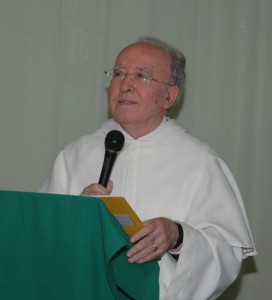 The Dominican normative on the priority of study, as path to the truth with compassion, is excellent. Knowing it is good, but practicing it is much better: practicing it is the best way of knowing. Knowing what we have to do and not doing it is not full knowing: “To know and not to do is not yet to know†(Buddhist saying). Confucius goes farther when he says:  “If you know what you have to do but do not do it, then you are worse than before.†Dominican brothers and sister and friends, let us study to know the truth and practice it in love. Therefore, let us walk the talk!
The Dominican normative on the priority of study, as path to the truth with compassion, is excellent. Knowing it is good, but practicing it is much better: practicing it is the best way of knowing. Knowing what we have to do and not doing it is not full knowing: “To know and not to do is not yet to know†(Buddhist saying). Confucius goes farther when he says:  “If you know what you have to do but do not do it, then you are worse than before.†Dominican brothers and sister and friends, let us study to know the truth and practice it in love. Therefore, let us walk the talk!
Throughout our history, the practice of study was and is punctuated by lights and shadows. Today in particular we can say that in many Dominican communities a study is in crisis, likewise – or perhaps more so – continuing formation. This is why beside the beautiful but cold norms on study; we need model-person-types – using the language of Max Scheler – to teach us warmly, with their lives, with their witnessing, that study is an attractive essential element of Dominican life and, indeed, a source of joy and happiness.
We have the fundamental and inspiring example of our Father Dominic. Before founding the Order of Preachers (1216), Dominic was sub-prior of the Cathedral Chapter of Osma (Spain), where he dedicated his life to contemplation – lectio divina – and study. “St. Dominic in founding the Order was truly innovative: he intimately linked study to the ministry of salvation. He himself always carried around with him St. Matthew’s gospel and St. Paul’s letters†(LCO 76). Debating with heretics, seeing the preaching done in the Church at that time, and preaching to the people, Dominic became firmly convinced that the preacher or teacher needed to study. Right after he founded the Order, Dominic showed the importance of study by sending – against the opinion of some of his brothers – his young candidates to the great universities of Europe to study.
From Dominic and through the significant contribution of Thomas Aquinas, the living tradition on study continued through the ages up to our time.
The chronicles of the beginnings of the Order tell us that every Dominican felt obliged to preach the truth every day at least to one person. In his book Have a Little Faith (2009), popular author Mitch Albom tells us the following story from a Rabbi. In his last sermon before retiring, Rabbi Reb asked his congregation for forgiveness for his sins, including “the sin of not studying every day.†Certainly, Dominicans – committed to study constantly by profession – are obliged to ask God and neighbor for forgiveness for the day or days they do not study – I did not study!
Let me close with the powerful words from our latest General Chapter:
Dominic listened and scrutinized with faith the Word of God. He was attentive to the guidance of the Church as well as paying special attention to the nascent cultures of his times. In relation to these three arenas, study gives us the knowledge of Scriptures, it reinforces contemplation which makes us friends of God and awakens our concerns for all of the disputed questions which challenge us today, questions about justice, peace, human rights, the suffering of the poor, the excluded, for victims, etc. As a result, study and the search for truth become an exercise in mercy and compassion†(ACG 2010 Rome, no. 54).
“Dominic listened†and was merciful! Through study and prayer, he knew the Truth and practiced it in mercy. Today also the Dominican preacher – every Dominican and community, our new St. Dominic Center of Studies – is called to listen to the Word of God in contemplative study mercifully; that is, by sharing with others the fruits of contemplation (contemplari et contemplata aliis tradere).
FAUSTO GOMEZ BERLANA, OP
St. Dominic Center of Studies
St. Dominic’s Priory
Macau, January 28, 2012

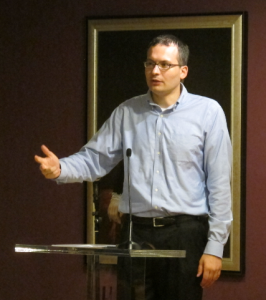 The speaker gave a comprehensive and scholarly view of Saint Thomas on emotions. As incarnate spirit, as “divine breath†(Gen 2:7) in a flesh, the human person is a being of emotions and passions and feelings. Saint Thomas treatise on the emotions, on “desire†found in his Commentary to the Sentences of Peter Lombard and in his Summa Theologiae is the longest and best structured up to Aquinas time. The teaching of Aquinas finds echo today in psychology, philosophy and theology. Thomas speaks not only of the passions or movements of the sense appetite but also of affections, which include also the movements of the intellectual appetite or the will – with its infinite desire for the good. Fr. Nicholas connected well passions and emotions with virtues to the point of saying that the more perfect the virtue the more it causes passion. Passions, he said, are not to be avoided, but to be ordered, channeled to become virtuous. Thus, passions and emotions can become not an obstacle but a resource for virtues. St. Thomas, always thought-provoking, tells us that our passions, are part of our human nature created by God and must be under the direction of right intellect and good will. I remember the words of St. Augustine, whom Thomas quotes often: “Passions are evil if love is evil, and good if it is good.”
The speaker gave a comprehensive and scholarly view of Saint Thomas on emotions. As incarnate spirit, as “divine breath†(Gen 2:7) in a flesh, the human person is a being of emotions and passions and feelings. Saint Thomas treatise on the emotions, on “desire†found in his Commentary to the Sentences of Peter Lombard and in his Summa Theologiae is the longest and best structured up to Aquinas time. The teaching of Aquinas finds echo today in psychology, philosophy and theology. Thomas speaks not only of the passions or movements of the sense appetite but also of affections, which include also the movements of the intellectual appetite or the will – with its infinite desire for the good. Fr. Nicholas connected well passions and emotions with virtues to the point of saying that the more perfect the virtue the more it causes passion. Passions, he said, are not to be avoided, but to be ordered, channeled to become virtuous. Thus, passions and emotions can become not an obstacle but a resource for virtues. St. Thomas, always thought-provoking, tells us that our passions, are part of our human nature created by God and must be under the direction of right intellect and good will. I remember the words of St. Augustine, whom Thomas quotes often: “Passions are evil if love is evil, and good if it is good.”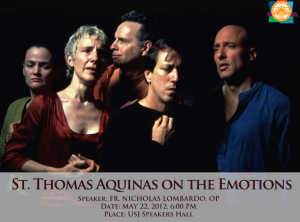 After the lecture and open forum, Fr. Joao Eleuterio, Coordinator of the USJ School of Christian Studies closed the session with words of appreciation and gratitude. The lecture was attended by about 70 persons, including the Dominican brothers and sisters, and some professors of the University of Saint Joseph. It was indeed an excellent academic session. (FGB)
After the lecture and open forum, Fr. Joao Eleuterio, Coordinator of the USJ School of Christian Studies closed the session with words of appreciation and gratitude. The lecture was attended by about 70 persons, including the Dominican brothers and sisters, and some professors of the University of Saint Joseph. It was indeed an excellent academic session. (FGB)
